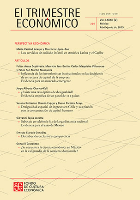
TRIMESTRE ECONOMICO
Scope & Guideline
Fostering Open Access to Economic Excellence.
Introduction
Aims and Scopes
- Economic History:
The journal frequently publishes papers that explore the historical evolution of economic systems, particularly in Latin America, examining the development of financial institutions, currency systems, and trade relationships. - Heterodox Economic Theories:
There is a consistent focus on heterodox economic theories, including Marxian, Keynesian, and other alternative frameworks, which challenge mainstream economic paradigms and offer critical insights into the functioning of economies. - Globalization and Development:
Research often centers on the effects of globalization on Latin American economies, including integration into global value chains and the implications for domestic industries and labor markets. - Monetary Policy and Financial Systems:
The journal addresses the role of monetary policy, banking systems, and financial regulation in shaping economic outcomes, particularly in the context of crises and structural adjustments. - Social and Economic Inequality:
Papers frequently examine issues of inequality, poverty, and social justice, analyzing the economic structures that perpetuate these conditions and exploring policy alternatives. - Environmental Economics:
There is an emerging interest in the intersection of economic development and environmental sustainability, with research focusing on climate change, resource management, and the economic impacts of environmental policies.
Trending and Emerging
- Post-Pandemic Economic Recovery:
Research related to the economic impacts of COVID-19 and subsequent recovery strategies has surged, focusing on the intersection of health crises and economic policy, particularly in Mexico and broader Latin America. - Technological Change and Labor Markets:
The journal is increasingly publishing studies on the effects of technological advancements on labor markets, including discussions on automation, gig economies, and the future of work. - Climate Change and Economic Policy:
There is a growing emphasis on the relationship between economic development and climate change, with research exploring sustainable practices, green technologies, and environmental policy frameworks. - Neoliberalism and Its Discontents:
Papers critiquing neoliberal economic policies and exploring alternative economic models are increasingly prevalent, reflecting a broader intellectual movement questioning the sustainability of neoliberalism in the region. - Inequality and Social Justice Movements:
The journal is placing more importance on issues of social justice and inequality, including analyses of gender, race, and class dynamics within economic contexts, highlighting the role of grassroots movements in shaping policy.
Declining or Waning
- Traditional Neoclassical Economic Models:
There seems to be a decline in the publication of papers that adhere strictly to traditional neoclassical economic models, reflecting a broader rejection of these frameworks in favor of more pluralistic approaches. - Focus on Purely Theoretical Models:
The journal has shifted away from purely theoretical economic models that do not incorporate empirical data or real-world applications, indicating a preference for research that is grounded in practical implications. - Limited Coverage of Microeconomic Issues:
There appears to be a waning interest in microeconomic analyses that do not connect to broader macroeconomic or socio-political themes, suggesting that researchers are focusing more on macro-level dynamics. - Historical Economic Analysis without Contemporary Relevance:
Papers that focus solely on historical economic analysis without linking to contemporary issues or current economic policies are becoming less common, indicating a desire for relevance in today's economic discourse.
Similar Journals
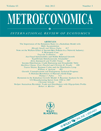
Metroeconomica
Elevating Economic Discourse through Rigorous Scholarship.Metroeconomica is a prestigious journal published by WILEY, focusing on the dynamic fields of Economics and Econometrics. Known for its rigorous peer-review process, this journal prides itself on disseminating high-quality research that informs and inspires scholars and practitioners alike. With an impact factor reflective of its significance in the discipline, Metroeconomica is categorized in the Q2 quartile for 2023, representing its competitive standing among influential economics publications. Since its inception in 1949 and continuing through a converged publication period until 2024, it has contributed significantly to advancing theoretical and empirical knowledge in economics. Researchers can access its content through traditional avenues, encouraging a wide readership among academics and industry experts. As the journal continues to evolve with the changing landscape of economic research, it remains a vital resource for those seeking to explore contemporary economic issues and foster impactful discussions within the field.
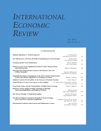
INTERNATIONAL ECONOMIC REVIEW
Connecting researchers to contemporary economic challenges.INTERNATIONAL ECONOMIC REVIEW is a prestigious journal dedicated to advancing knowledge in the fields of economics and econometrics. Published by Wiley in the United Kingdom, this journal boasts an impressive Q1 ranking in the 2023 category of Economics and Econometrics, reflecting its significant impact in the academic community. With a continued publication since its inception in 1979, it offers a platform for rigorous scholarly articles that address contemporary issues, theoretical developments, and empirical findings in economics. Although it does not currently offer open access options, the journal maintains broad accessibility through institutional subscriptions. Researchers, professionals, and students are encouraged to contribute to and engage with this leading publication to foster knowledge exchange and stimulate scholarly dialogue in economic research. With its commitment to high-quality scholarship, the INTERNATIONAL ECONOMIC REVIEW remains a vital resource for developing insights that inform both policy and practice.
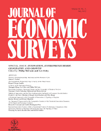
JOURNAL OF ECONOMIC SURVEYS
Transforming Data into Economic UnderstandingJOURNAL OF ECONOMIC SURVEYS, published by WILEY, is a highly esteemed peer-reviewed journal dedicated to the field of economics and econometrics. With its distinguished position as a Q1 journal and a Scopus rank of #38 out of 716, the journal consistently showcases cutting-edge research that significantly contributes to the understanding and development of economic theories and practices. Since its inception in 1987, this journal has been a cornerstone for economists, providing vital surveys that systematically address contemporary issues and emerging trends within the discipline. Researchers and practitioners alike rely on the journal for its rigorous analysis and comprehensive reviews, making it an essential resource for anyone involved in economic research. Although the journal does not currently offer open access options, its exceptional impact and relevance in the field continue to engage a global audience of scholars and policymakers.

Review of Economic Analysis
Fostering Innovation in Economic Research and CollaborationReview of Economic Analysis is a distinguished open-access journal published by DIGITAL INITIATIVES, UNIVERSITY OF WATERLOO, that has been committed to disseminating high-quality economic research since its inception in 2009. Renowned for its rigorous peer-review process, the journal provides a platform for innovative findings in the field of Economics and Econometrics. With an impact factor that underlines its relevance in academic circles, the journal continues to uphold scholarly excellence, currently classified in the Q3 category (2023) within the Economics and Econometrics domains, ranking #549 out of 716 in Scopus. The open-access model ensures that critical research is accessible globally, fostering collaboration and knowledge-sharing among researchers, professionals, and students. Interested contributors and readers can connect with the journal's vibrant academic community based in Waterloo, Canada, and explore a diverse array of articles that push the boundaries of economic analysis and understanding.
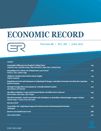
ECONOMIC RECORD
Connecting Scholars Through Rigorous ResearchECONOMIC RECORD is a distinguished academic journal published by Wiley that has been a vital resource in the field of economics since its inception in 1925. With a focus on disseminating high-quality research, the journal covers a broad range of topics within economics and econometrics, making it an essential platform for scholars, professionals, and students alike. Although it currently does not offer open access, the journal is indexed in leading databases and maintains a respectable Q3 category ranking in the Economics and Econometrics field for 2023. The publication operates on a biennial timeline, continuing to contribute significantly to the literature from 1934 to 2024. Researchers will find its rigorous peer-review process ensures that only impactful studies are included, providing a reliable source for current trends and advancements in economic theory and practice. Located in the United Kingdom, ECONOMIC RECORD is dedicated to fostering an environment of academic excellence and innovation in the economics discipline.
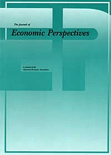
JOURNAL OF ECONOMIC PERSPECTIVES
Shaping the Future of Economic Scholarship and InsightJOURNAL OF ECONOMIC PERSPECTIVES, published by the American Economic Association, is a leading academic journal that serves as a vital resource for researchers, professionals, and students in the fields of economics and econometrics. With an impressive impact factor, it ranks in the top Q1 quartile according to the 2023 statistics, demonstrating its significant influence and contribution to the discipline, particularly with a notable Scopus Rank of #21 out of 716 in the category of Economics and Econometrics. Spanning from 1992 to 2024, the journal provides a platform for rigorous and comprehensive analyses that illuminate contemporary economic issues and perspectives. While it does not currently offer open access options, its thorough and insightful content ensures it remains a respected and essential part of economic literature, addressing a diverse array of topics that resonate with the academic community.
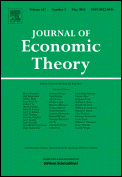
JOURNAL OF ECONOMIC THEORY
Connecting Scholars through Economic InnovationThe JOURNAL OF ECONOMIC THEORY, published by Academic Press Inc Elsevier Science, stands as a paramount platform for disseminating groundbreaking research within the field of economics and econometrics. With an impressive history dating back to 1969 and a convergence period extending to 2024, this journal has continually shaped the academic discourse around critical economic theories and methodologies. Currently recognized in the top quartile (Q1) of its category for 2023, it ranks prominently among its peers, boasting an impactful scholarly contribution reflected in its Scopus ranking—positioned at #348 out of 716 journals in the domain. Although it does not offer Open Access, the journal provides an essential resource for those seeking to enhance their understanding of complex economic models and strategies. Researchers, professionals, and students alike will find the JOURNAL OF ECONOMIC THEORY to be an invaluable asset for their academic and professional pursuits in the rapidly evolving landscape of economics.
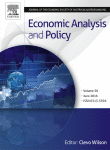
Economic Analysis and Policy
Empowering Economists to Address Today's ChallengesEconomic Analysis and Policy is an esteemed academic journal published by ELSEVIER, dedicated to advancing the field of economics and econometrics since its inception in 1970. Based in the Netherlands, this journal plays a pivotal role in disseminating high-quality research that addresses contemporary economic issues and policy challenges. With an impressive Q1 ranking in both the Economics and Econometrics categories, and recognition in the top 91st percentile of Scopus rankings, it is a leading platform for scholars, professionals, and students seeking to contribute to and engage with the evolution of economic thought. The journal does not currently operate on an open access model, allowing it to maintain rigorous peer-review standards that ensure the integrity and impact of published research. As a vital resource for anyone interested in the intersection of theory and policy in economics, Economic Analysis and Policy fosters a community committed to rigorous analysis and innovative solutions in the economic domain.
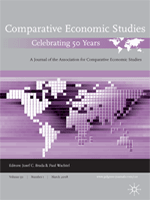
Comparative Economic Studies
Pioneering Research for a Sustainable Economic FutureComparative Economic Studies is a prominent academic journal dedicated to the field of economics, published by Palgrave Macmillan Ltd. Now in its converged years from 1996 to 2024, this journal provides a robust platform for innovative research and critical analysis within the economics and econometrics arenas. With an ISSN of 0888-7233 and an E-ISSN of 1478-3320, it has established itself as a vital resource for scholars and practitioners interested in comparative economic analysis, policy evaluation, and theoretical advancements. Recognized for its quality, the journal is classified in the Q3 category in 2023, reflecting its solid standing within the field, with a Scopus rank of 390 out of 716 journals in economics and econometrics. Although it currently does not offer open-access options, the journal is committed to disseminating significant findings that influence policy and scholarship globally. Its well-curated articles play an essential role in shaping contemporary economic discourse, making it an indispensable resource for researchers, professionals, and students alike.
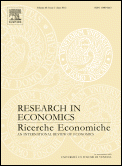
Research in Economics
Fostering rigorous analysis and theoretical development.Research in Economics, published by ELSEVIER SCI LTD, is a distinguished peer-reviewed journal that addresses pivotal issues in the field of economics and econometrics. Since its inception in 1997, the journal has provided a platform for innovative research and theoretical development, welcoming contributions that push the boundaries of traditional economic thought. With an ISSN of 1090-9443 and an E-ISSN of 1090-9451, it currently holds a respectable position in the Q3 category of the 2023 rankings for Economics and Econometrics. Despite its current Scopus rank of #500 out of 716, representing the 30th percentile, the journal continues to cultivate a rich community of researchers, practitioners, and students dedicated to advancing economic knowledge. While it operates without an Open Access option, the journal remains committed to disseminating high-quality research that informs both academic scholarship and practical applications in the economic landscape.